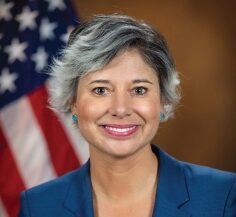Democrat Maggie Goodlander may have spent the past decade working in Washington, D.C., and she may have had to recently rent a Nashua apartment to become a resident of the Second Congressional District, but she wants voters to know something.
“New Hampshire has always been my home.”
Just not the one she’s actually lived in.
The issue of Goodlander’s Granite State absence came up when WMUR’s Adam Sexton asked her about the “carpetbagger” questions surrounding her first-time bid for public office in New Hampshire.
Sexton also asked her opponent in the Democratic primary, Executive Councilor Colin Van Ostern.
“She said she’s rented an apartment in Nashua earlier in this campaign. She mentioned that it’s more convenient for her as she runs in the campaign. And as I understand, I think the last time she voted in this district was when George W. Bush was president. I believe it was by absentee back then, almost 20 years ago. That doesn’t mean she doesn’t have a right to run,” Van Ostern said.
“But, man — I do think that makes it harder to do a good job to represent us,” he added.
(Goodlander’s last vote cast in the Second Congressional District was in 2008, via absentee ballot, and from a house her parents had already sold before Election Day.)
WMUR aired separate interviews with the two NH-02 candidates on Sunday.
Goodlander was born in Nashua to a prominent, politically active family on Election Day in 1986. But she hasn’t lived in the district since at least 2005, when she left to attend Yale College. (She was a student at Groton, a tony boarding school in Massachusetts before that.)
After graduating from Yale, Goodlander worked in Washington until just a few months ago. Her impressive resume includes clerking for U.S. Supreme Court Justice Stephen Breyer, working for U.S. Attorney General Merrick Garland and, in 2024, serving as a White House senior advisor overseeing President Joe Biden’s “Unity Agenda.”
She also established a law practice in New Hampshire in 2023, and briefly taught constitutional law at Dartmouth College and the University of New Hampshire.
Asked by a reporter about moving into the district just months before the primary, Goodlander retorted, “I am a renter, and there should be more renters in Congress.”
The “carpetbagger” attack is common in New Hampshire campaigns, perhaps most notoriously when Republican Scott Brown ran against incumbent U.S. Sen. Jeanne Shaheen in 2014. While Brown had family ties to the Granite State, he had served in the Massachusetts legislature and as a U.S. senator from the Bay State before challenging Shaheen.
Brown’s narrow 51.5 to 48.2 percent loss to a popular incumbent in a blue-leaning state was a sign to many Granite State campaign professionals that the carpetbagger issue had little bite. Brown agrees.
“People who are born here sometimes leave to go and do wonderful things somewhere else. And many Granite Staters I know — including myself — always had the intentions of coming back,” he told NHJournal. “Why wouldn’t they? We live in one of the best states in the country.”
It’s also one of the smallest — the tenth smallest population in the U.S. — and has one of the highest percentages of residents who were born in other states and chose to move here. Fewer than 40 percent of Granite Staters are native born, well below the national average of around 60 percent. (In Louisiana, nearly 80 percent of residents were born in the state.)
As a result, the “carpetbagger” argument often falls on deaf ears.
Still, Van Ostern’s biography over the past two decades is very different from Goodlander’s.
Born in California in 1979, Van Ostern has lived in the Granite State since at least April 2006 when he took a job in public relations for the Tuck School of Business at Dartmouth College. He’s since worked for Stonyfield Dairy, Southern New Hampshire University and Alumni Ventures, all based in New Hampshire. And he served two terms on the New Hampshire Executive Council before running for governor against Chris Sununu in 2016. (Van Ostern also made an unsuccessful bid to replace Secretary of State Bill Gardner in 2018.)
He has a strong ally in the Second District’s current congresswoman, Democrat Annie Kuster, who has endorsed him in the primary.
“For the last 20 years. I’ve been leading businesses in this state, representing dozens of cities and towns in our district, volunteering in our community — and not just the bullet points that you put on your resume or put in campaign ads,” Van Ostern said.
Goodlander counters that, while she may have spent scant time in the district, “I am proudly a fourth generation Nashua girl, born and raised,” she told Sexton.
“From my living room today, I can see the shoe factory where my great-grandfather worked and the hospital where I was born on Election Day. Actually, my mom voted before she went to St Joe’s to give birth to me.”
In many ways, Goodlander’s response echoes that of Brown in 2014, who highlighted the fact that he was born at the Portsmouth Naval Shipyard and his mother once worked as a waitress at Hampton Beach.
Brown says Goodlander’s challenge isn’t her biography but her work in the Biden administration.
“Like the other candidates in her party, she’s in lockstep with their leadership. She will not close the border, or help lower inflation or taxes, or cut spending, or help us become energy independent,” Brown said.
As for the carpetbagger claims, Moore says any campaign, Republican or Democrat, betting on that issue to impact the outcome of the race is miscalculating.
“Put it this way: If your campaign strategy is to count on New Hampshire being as parochial as Maine, you might want to rethink your strategy.”





